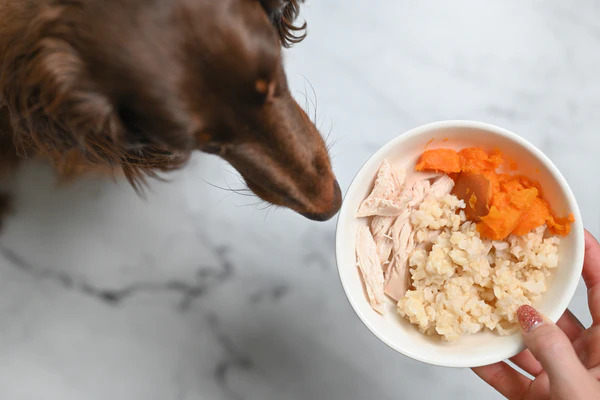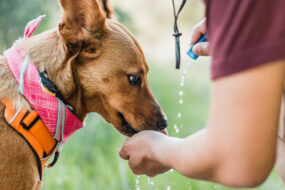
Dealing with a vomiting dog can be distressing, especially when it happens unexpectedly. Occasional vomiting is usually harmless, but frequent episodes may indicate an underlying issue that needs attention. This guide provides practical information on why dogs vomit, what to look for in vomit when to seek medical care, and effective home remedies to help your dog feel better.
Why Do Dogs Vomit?
Vomiting is the body’s natural defense to expel harmful substances from the stomach before they can cause harm. When your dog ingests something that doesn’t sit right, such as spoiled food or a toxic substance, the brain signals the stomach to begin vomiting. Vomiting can also result from irritation, stomach fullness, or acid buildup.
Identifying Normal Vomit vs. Abnormal Vomit
It’s essential to accurately distinguish between normal and abnormal vomiting to assess your dog’s health.
- Normal Vomit: Typically includes food, water, and yellow-green bile. Yellow foam is also common.
- Abnormal Vomit: Vomit with blood, blackish-brown content resembling coffee grounds, or non-digestible objects (like parts of toys) requires urgent veterinary care. Unusual items in vomit could signal blockages that need immediate attention.
Medical Treatments for Dog Vomiting
When vomiting persists, it’s crucial to identify the cause. A veterinarian may perform blood tests, X-rays, or ultrasounds to determine the root of the problem. Treatments commonly include:
- Rehydration Therapy: Intravenous fluids are administered to combat dehydration caused by vomiting.
- Anti-Nausea Medication: Veterinarians can prescribe injectable or oral anti-nausea medications to halt vomiting and reduce stomach discomfort.
- Specialized Diet and Supplements: In some cases, your vet might recommend gastroprotectants, probiotics, or a prescription diet to aid digestion and support your dog’s gastrointestinal health.
Home Remedies for Vomiting in Dogs
If your dog continues to vomit bile or experiences mild digestive upset, these home remedies may help. However, always consult with a veterinarian before trying any new treatments.
1. Adjusting Your Dog’s Diet
Frequent vomiting can often be managed with diet changes. Dogs with bilious vomiting syndrome or pancreatitis benefit from smaller, more frequent meals with easy-to-digest protein sources.
- Meal Frequency: Feeding four small meals a day can help keep the stomach settled. Try feeding early in the morning and late at night to prevent bile buildup.
- Easy-to-Digest Options: For short-term issues, some pet-safe foods like boiled chicken and rice can help soothe the stomach. Avoid prolonged feeding of unbalanced diets like chicken and rice, as they lack essential nutrients.
The old practice of withholding food for 24 hours after vomiting is no longer recommended. Providing regular, small amounts of food ensures the gastrointestinal tract remains healthy and energized.
2. Ginger for Nausea Relief
Ginger is widely known for its natural anti-nausea properties, which can benefit dogs with upset stomachs.
- Ginger Tea: Boil fresh ginger root in water, let it cool, and give small amounts to your dog throughout the day. This remedy can help calm the stomach and alleviate nausea.
3. Electrolyte Rehydr+ation
Vomiting can lead to rapid dehydration. Electrolyte sachets designed specifically for dogs can help maintain hydration levels.
- Electrolyte Sachets: Available at most pet stores or veterinary clinics, these sachets are formulated for dogs’ unique needs. Follow the instructions on the package carefully, and avoid using human electrolyte solutions, which have different concentrations.
4. Probiotics for Digestive Health
After a bout of vomiting, probiotics can help restore the balance of healthy bacteria in your dog’s gut.
- Dog-Specific Probiotics: Probiotic supplements tailored to canine digestion promote a balanced gut environment, which aids in digestion and recovery. Avoid giving human probiotics, as they may not be suitable for dogs’ specific microbiomes.
5. Tender Loving Care (TLC)
Vomiting can make dogs feel miserable, and emotional support goes a long way in aiding their recovery.
- Provide Comfort: Wipe away any drool, offer fresh water in small amounts, and keep your dog in a quiet, stress-free space. Avoid exercise and vigorous play until they feel better.
When to Seek Veterinary Help
Knowing when to seek veterinary care is essential. Contact your veterinarian if:
- Frequent Vomiting Occurs: Your dog vomits more than three times in 24 hours or more than three times a week.
- Abnormal Vomit is Present: You notice blood or coffee-ground-like material.
- Other Symptoms Appear: Signs like lethargy, loss of appetite, or diarrhea accompany the vomiting.
Frequently Asked Questions (FAQs)
Can I give my dog human anti-nausea medication?
No, never give human medications to dogs without consulting a vet. Human anti-nausea drugs like Metoclopramide or Ondansetron may have adverse effects and can mask serious health issues, like bowel obstructions.
Is it dangerous for my dog to vomit?
Yes, in some cases. Persistent vomiting can lead to dehydration, which is potentially life-threatening. Severe conditions such as stomach ulcers or intestinal blockages can also lead to fatalities if not treated promptly.
Should I let my dog re-eat the vomit?
No, clean up vomit as soon as possible. Re-ingesting vomit may expose your dog to harmful substances again. Instead, offer fresh water in moderation after they’ve vomited.
Is it okay for my dog to eat grass to induce vomiting?
Not necessarily. While some dogs eat grass, excessive consumption can cause gastrointestinal blockages. Frequent grass eating may indicate an unbalanced diet, so consult your vet if this becomes a habit.
Conclusion: Consult a Vet for Persistent Vomiting
While home remedies can provide relief for a vomiting dog, they aren’t a substitute for veterinary care. If your dog’s symptoms continue or worsen, schedule an appointment with a veterinarian for a comprehensive health assessment. Prioritizing professional advice ensures your furry friend receives the best possible care.










